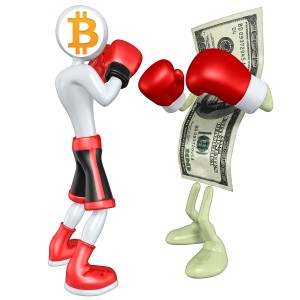The concept of competing currencies has been the topic of fierce debate for decades. Over the years, two of the most prolific economists, Friedrich Hayek and Milton Friedman, discussed the matter repeatedly. Hayek, an Austrian economist, supported the idea, while Friedman, a Chicago economist, believed it would never be feasible.
Hayek argued that issuers of currency would offer the marketplace a constant and valuable currency, while giving the crop of current and new consumers a long-term viable currency that is different from government-issued money. If it would be volatile, risky and fail to provide a stable exchange rate then it would not succeed in the marketplace.
Friedman, meanwhile, argued that competing currencies would lead to constant changes in monetary purchasing power. Although he was a staunch opponent to the Federal Reserve System in the latter part of his life, he made the case that a central bank can give the citizens a stable currency with strong purchasing power. He would cite Deutschmarks and Swiss francs as examples.
 In today’s world, one currency is gaining momentum and many of its proponents see it as the future: bitcoin. Indeed, the digital currency has been on a wild rollercoaster ride in the past month: its value dipped to below $400, a large exchange platform announced its insolvency and United States officials are now calling for bans.
In today’s world, one currency is gaining momentum and many of its proponents see it as the future: bitcoin. Indeed, the digital currency has been on a wild rollercoaster ride in the past month: its value dipped to below $400, a large exchange platform announced its insolvency and United States officials are now calling for bans.
Over the past year, bitcoin has experienced immense volatility: at the beginning of 2013, it traded at a few bucks and at the end of the year it hit approximately $1,200. At the time of this writing, it’s inching towards $600 again. Is this a stable currency that Hayek would endorse or one with inconsistency that Friedman would oppose?
We reported in January of a video of Friedman predicting the rise of an e-cash system:
“I think that the Internet is going to be one of the major forces for reducing the role of government. The one thing that’s missing, but that will soon be developed, is a reliable e-cash, a method whereby on the Internet you can transfer funds from A to B without A knowing B or B knowing A. The way I can take a $20 bill hand it over to you and then there’s no record of where it came from.”
“You may get that without knowing who I am. That kind of thing will develop on the Internet and that will make it even easier for people using the Internet. Of course, it has its negative side. It means the gangsters, the people who are engaged in illegal transactions, will also have an easier way to carry on their business.”
Whether or not he would support the cryptocurrency and other competing currencies would be entirely left up to speculation. One thing is for sure: today’s libertarians are split on bitcoin and anyone who reads Economic Policy Journal or Zerohedge would understand this.
The debate between the anti-government, sound currency crowd has now become: what’s a true alternative to fiat money, bitcoin or gold? The yellow metal is 6,000 years old and bitcoin is just a four years old. Friedman himself wasn’t much of a goldbug, but Hayek was. It’s hard to distinguish if Friedman would be in support of bitcoin, but perhaps the answer lies in his later work when he wrote (PDF) that there is “no reason currently to prohibit banks or other groups from issuing hand-to-hand currency.”
It can certainly be concurred upon that his stance of only permitting governments to maintain a monopoly on currency became lukewarm. Sure, many believe bitcoin isn’t a stabilized currency, but its supporters consistently say that it’s in its infancy stage and baby steps have to be taken. Essentially, bitcoiners espouse that the community is working out the kinks, glitches and malfunctions in order to perfect the digital currency and offer consumers worldwide a viable option to their respective currencies.
Whatever the outcome if bitcoin is, a lot of libertarians say they shouldn’t be separated into factions and still unite as one in the fight against inflationary, Federal Reserve-controlled currencies.
For more Bitcoin news follow PFhub on FaceBook, Twitter or bookmark this page.



